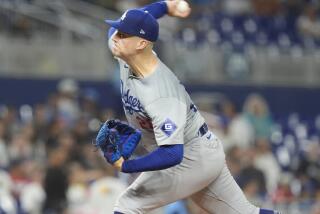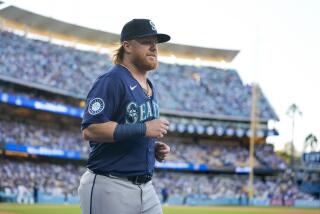Before Ankiel, Darwin showed how to evolve
- Share via
Bobby Darwin was Rick Ankiel before Rick Ankiel was born.
Ankiel, of course, is the St. Louis Cardinals player whose never-say-die spirit has provided perhaps the sunniest sports story of the summer: his extraordinary transition from major league pitcher to major league outfielder.
To which Darwin might say, “Been there, done that.”
A hard-throwing, hard-luck right-hander, Darwin was once a promising pitching prospect-turned-outfielder too. He pitched for the Angels and the Dodgers in the 1960s, making his major league debut with the Angels only eight months after graduating from Los Angeles Jordan High in January 1962.
But a string of shoulder and elbow injuries prompted an improbable but career-saving transformation, and Darwin spent his most productive major league seasons as a power-hitting outfielder for the Minnesota Twins in the 1970s.
This summer, the 64-year-old grandfather and longtime Dodgers scout is watching with great interest as Ankiel follows in his footsteps.
“I’m pulling for him, I really am,” Darwin says from his home in Cerritos, where he lives with Roxanna, his wife of 42 years. “I know what he’s going through. I look to see what he’s doing every day because, hey, I went through that.”
Not many have made the pitcher-to-slugger switch successfully -- Babe Ruth, of course, is the most notable exception -- but Darwin figured he had little choice when he made the move eight years after signing with the Angels.
“I thought, ‘If I don’t do this, my career’s over,’ ” he says.
He had been the starting pitcher for the Angels on Sept. 30, 1962, a season-ending 6-1 loss at Cleveland in which Darwin, then 19, gave up six runs and eight hits, walked four and struck out six in 3 1/3 innings.
“I was wild,” Darwin remembers, “but I punched out six batters.”
He would not pitch again in the majors, however, until 1969, by which time he had suffered a torn rotator cuff, been claimed on waivers by the Baltimore Orioles and suffered an elbow injury while sliding into second base.
He wound up with the Dodgers by chance. Working during the off-season as a tow-truck driver, he answered a random call from Dodgers general manager Al Campanis, who had been involved in an auto accident. He introduced himself and a short time later the Dodgers claimed him in the major league draft of December 1968.
“Happy as a son of a gun” to be playing for his hometown team, Darwin felt rejuvenated as he opened the 1969 season with the Dodgers. But he suffered another elbow injury after making only three unremarkable relief appearances.
Optioned to triple-A Spokane, he says his arm was never more than 50% sound that year. He was 0-6 at Spokane with a 6.49 earned-run average.
“I always had a sore arm,” he says.
But in batting practice, Darwin notes, “I was launching balls way out of the ballpark.” Tom Lasorda, his persuasive triple-A manager, suggested that he might have a better chance of returning to the majors as an outfielder.
“He starts saying to me, ‘Hey, what about giving up this pitching thing and trying to hit?’ ” Darwin remembers. “I said, ‘I don’t want to do that,’ but he approached me again. He said, ‘I’m serious. You’ve got a good swing, you’re strong, you’re athletic. I think you should try it.’ And I thought, ‘Maybe I should.’ ”
In the season finale, Lasorda penciled him into the lineup as an outfielder, and Darwin hit a home run in his second at-bat.
“This leather-lunged fan was sitting behind me,” Lasorda recalls. “I could hear him all over the park: ‘Hey Lasorda, you dummy, we’ve got a chance to win and you’re putting a pitcher in the outfield? You ought to be fired. Go back to where you came from, you bum.’ I said, ‘Oh, God, do I have to listen to this guy all day?’
“So then Darwin hits one over the 340 sign like it was shot out of a cannon. As he comes around third base, I give him a big pat on the back and I turn around to look at this leather-lunged fan. He stands up and says, ‘Hey Lasorda, you dummy, how come that guy hasn’t been playing all season?’ ”
Now confident that he could pull this off, Darwin all but lived in a batting cage when not driving his tow truck that winter. At Bakersfield in 1970, his first season as an outfielder, he hit 23 home runs, only one fewer than the league leader.
Still, when the Dodgers traded him to the Twins after the 1971 season, Darwin was 28 and his resume included only 21 major league at-bats. But in his first three seasons in Minnesota he hit 22, 18 and 25 home runs. He averaged 88 runs batted in. In winter ball, he set home run records in Mexico and Venezuela.
His production tailed off after that, however, and after being traded three more times, Darwin retired after the 1977 season.
But he had proved a point. He had shown that a difficult transition was not impossible.
“When I did it,” he says, “I didn’t think that much of it. I didn’t even know about Babe Ruth doing this until later. But now people say, ‘You did that?’ It’s starting to sink in now after 30 years, what I accomplished. After I hear that only a few people have done this and I’m one of them, I say, ‘Wow, that was something.’ ”
--
More to Read
Go beyond the scoreboard
Get the latest on L.A.'s teams in the daily Sports Report newsletter.
You may occasionally receive promotional content from the Los Angeles Times.






